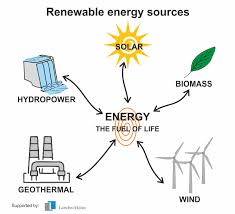The Power of Renewable Energy
In today’s world, the importance of renewable energy sources cannot be overstated. As we face the challenges of climate change and environmental degradation, transitioning to renewable energy is crucial for a sustainable future.
Renewable energy sources, such as solar, wind, hydroelectric, and geothermal power, are derived from natural processes that are constantly replenished. Unlike fossil fuels, which are finite and contribute to greenhouse gas emissions, renewable energy offers a clean and abundant alternative.
Solar power harnesses the energy of the sun through photovoltaic cells, converting sunlight into electricity. Wind power utilizes turbines to capture the kinetic energy of moving air. Hydroelectric power generates electricity from flowing water in rivers or dams. Geothermal power taps into the heat stored beneath the Earth’s surface.
One of the key advantages of renewable energy is its minimal environmental impact. By reducing our reliance on fossil fuels, we can decrease air pollution, mitigate climate change, and protect ecosystems. Additionally, renewable energy sources offer economic benefits by creating jobs in the green energy sector and promoting innovation in clean technologies.
Investing in renewable energy infrastructure is essential for building a more resilient and sustainable energy system. Governments, businesses, and individuals worldwide are increasingly recognizing the value of transitioning to renewables as a way to secure a cleaner and more prosperous future for generations to come.
As we continue to expand our use of renewable energy sources, we move closer to achieving a greener and more sustainable world. By harnessing the power of renewables, we can reduce our carbon footprint, preserve natural resources, and pave the way for a brighter tomorrow.
6 Practical Tips to Embrace Renewable Energy at Home
- Consider installing solar panels on your roof to generate renewable electricity.
- Switch to using energy-efficient appliances to reduce your overall energy consumption.
- Invest in a programmable thermostat to better control your heating and cooling usage.
- Explore wind energy options if you live in a windy area for another renewable energy source.
- Reduce water waste by fixing leaks and installing water-saving fixtures in your home.
- Support policies and initiatives that promote the use of renewable energy sources in your community.
Consider installing solar panels on your roof to generate renewable electricity.
Consider installing solar panels on your roof to generate renewable electricity. By harnessing the power of the sun, solar panels can provide a clean and sustainable source of energy for your home or business. Not only can solar panels help reduce your carbon footprint and lower your electricity bills, but they also contribute to a more environmentally friendly energy system. Investing in solar energy is a proactive step towards a greener future and demonstrates a commitment to sustainable living.
Switch to using energy-efficient appliances to reduce your overall energy consumption.
Switching to energy-efficient appliances is a practical and effective way to embrace renewable energy in our daily lives. By upgrading to appliances that are designed to consume less energy, we can significantly reduce our overall energy consumption and contribute to a more sustainable future. Energy-efficient appliances not only help lower electricity bills but also decrease the demand for non-renewable energy sources, thus minimizing our environmental impact. Making this simple change can make a big difference in conserving resources and promoting a greener lifestyle for the benefit of both the planet and future generations.
Invest in a programmable thermostat to better control your heating and cooling usage.
Investing in a programmable thermostat is a simple yet effective way to enhance your control over heating and cooling usage in your home. By programming specific temperature settings based on your schedule, you can optimize energy efficiency and reduce unnecessary heating and cooling when you are away or asleep. This smart investment not only helps you save on energy costs but also contributes to a more sustainable lifestyle by minimizing energy waste.
Explore wind energy options if you live in a windy area for another renewable energy source.
Living in a windy area presents a unique opportunity to explore wind energy as a viable renewable energy source. Harnessing the power of the wind through wind turbines can provide a sustainable and clean alternative to traditional fossil fuels. By taking advantage of the natural resource of wind in your area, you can contribute to reducing carbon emissions, promoting environmental sustainability, and moving towards a more renewable energy future.
Reduce water waste by fixing leaks and installing water-saving fixtures in your home.
To promote sustainability and conserve resources, it is essential to address water waste in our homes. By promptly fixing leaks and installing water-saving fixtures, such as low-flow faucets and toilets, we can significantly reduce our water consumption. Taking simple steps like these not only helps to preserve this precious resource but also contributes to a more eco-friendly lifestyle. Making these changes in our homes can have a positive impact on the environment by promoting responsible water usage and supporting efforts towards a more sustainable future.
Support policies and initiatives that promote the use of renewable energy sources in your community.
Supporting policies and initiatives that promote the use of renewable energy sources in your community is crucial for advancing sustainability and combating climate change. By advocating for renewable energy incentives, such as tax credits for solar installations or funding for wind power projects, you can help accelerate the transition to a cleaner energy future. Encouraging local governments to prioritize renewable energy development and investing in community-based renewable projects can have a significant impact on reducing carbon emissions and building a more resilient energy infrastructure. Together, we can make a difference by supporting initiatives that promote the widespread adoption of renewables in our communities.

